Zscaler Bundle
Can Zscaler Conquer the Cybersecurity Realm?
Zscaler's recent acquisition of Red Canary marks a significant step in its ambitious growth strategy. This move, expected to close by August 2025, aims to bolster its AI-driven security operations and solidify its leadership in the dynamic cybersecurity market. Founded in 2007, Zscaler has rapidly evolved, driven by a vision to revolutionize network security through its cloud-delivered platform.
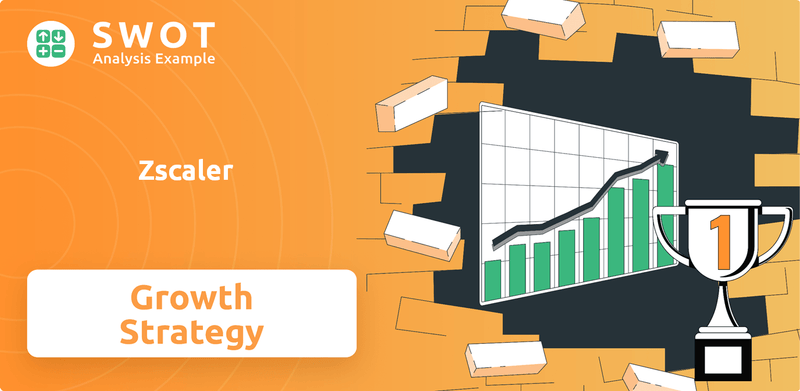
As a leader in cloud security, Zscaler protects thousands of customers, including nearly half of the Fortune 500. Its Zero Trust Exchange platform processes hundreds of billions of transactions daily, showcasing its massive scale and impact. This Zscaler SWOT Analysis will help you understand its strengths, weaknesses, opportunities, and threats. Delving into Zscaler's future prospects requires a deep dive into its strategic expansions, continuous innovation, and financial performance, including Zscaler revenue growth forecast and Zscaler stock price prediction.
How Is Zscaler Expanding Its Reach?
The Zscaler growth strategy is heavily focused on expanding its market presence, innovating its product offerings, and strategically acquiring other companies. This approach is designed to capitalize on the growing demand for cloud security solutions and to strengthen its position in the cybersecurity market. The company's focus on large enterprise clients and strategic product expansions are key drivers of its growth trajectory.
Zscaler's future prospects are closely tied to its ability to penetrate new geographical markets, particularly in regions like EMEA and APAC, where SASE solutions are experiencing rapid adoption. The company's financial performance and strategic initiatives indicate a strong potential for continued growth and market leadership in the cloud security space. Detailed Zscaler company analysis reveals a strategic focus on innovation and market expansion.
The company's strategy includes a multi-faceted approach to growth, encompassing geographical expansion, product innovation, and strategic acquisitions. This comprehensive strategy is designed to ensure sustainable growth and to maintain a competitive edge in the evolving cybersecurity landscape.
Zscaler is actively expanding into new geographical markets, with a particular emphasis on EMEA and APAC regions. These areas are showing significant growth in the adoption of SASE solutions, indicating a strong demand for Zscaler's services. This expansion is crucial for increasing the company's global footprint and revenue streams.
A key element of Zscaler's growth strategy is targeting large-scale deals with Fortune 500 and Global 2000 enterprises. Currently, approximately 45% of Fortune 500 companies and over 35% of Global 2000 companies use Zscaler's solutions. This focus on large clients is expected to accelerate revenue growth and enhance market share.
Zscaler continues to diversify its revenue streams through emerging products like Zero Trust SD-WAN and workload protection. These innovative offerings are growing at twice the rate of its core products. This diversification helps the company meet evolving cybersecurity trends and customer needs.
Strategic acquisitions are a significant part of Zscaler's growth strategy. The acquisition of Red Canary in May 2025, aimed to strengthen managed detection and response and threat intelligence capabilities. Other acquisitions, such as Avalor in 2024 (for approximately $310 million) and Airgap Networks, have added capabilities in security data fabric and ransomware prevention. These acquisitions enhance Zscaler's product offerings and market position.
Zscaler's financial targets reflect its ambitious growth plans. The company expects to surpass $3 billion in Annual Recurring Revenue (ARR) by the end of the fiscal year and is targeting $5 billion in ARR in the longer term. This growth is driven by ongoing customer commitments and strategic product expansions, demonstrating strong confidence in the company's future. For a deeper look into the company's ownership structure and potential investment opportunities, consider reading about the Owners & Shareholders of Zscaler.
Zscaler has launched various initiatives to support its growth strategy. The Z-Flex purchasing program, for example, is designed to provide customers with flexible platform adoption options. This program contributed over $65 million in Total Contract Value (TCV) bookings in Q3 Fiscal Year 2025. These initiatives help Zscaler expand its customer base and drive revenue growth.
- Emphasis on Zero Trust Security: Zscaler is heavily promoting Zero Trust security solutions to meet the growing demand for robust cybersecurity.
- Cloud Security Solutions: The company continues to enhance its cloud security solutions to cater to the evolving needs of its customers.
- Cybersecurity Market Trends: Zscaler is actively adapting to the latest cybersecurity market trends to stay ahead of the competition.
- Partnerships and Acquisitions: Strategic partnerships and acquisitions play a crucial role in expanding Zscaler's capabilities and market reach.
Zscaler SWOT Analysis
- Complete SWOT Breakdown
- Fully Customizable
- Editable in Excel & Word
- Professional Formatting
- Investor-Ready Format
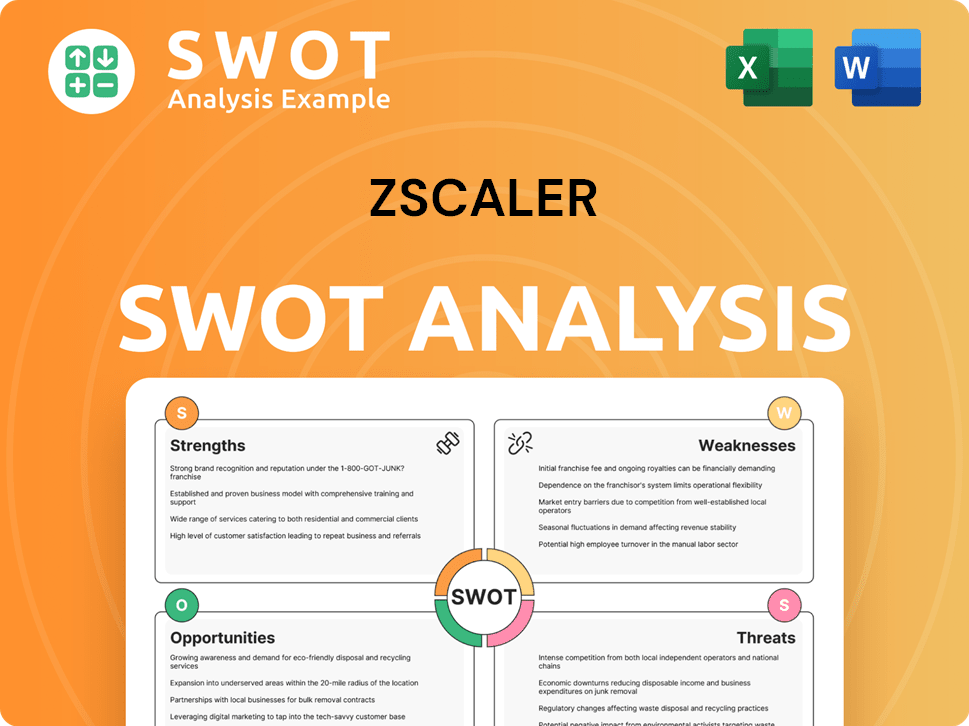
How Does Zscaler Invest in Innovation?
The core of the Zscaler growth strategy is its commitment to innovation and technology, especially in the rapidly evolving cloud security market. This approach allows the company to stay ahead of emerging cybersecurity threats. Zscaler's future prospects are closely tied to its ability to continuously enhance its offerings and adapt to changing customer needs.
Zscaler's focus on digital transformation and cloud-native architecture is key to its ability to provide scalable and flexible security services. This strategy is designed to meet the demands of businesses as they evolve. The company's dedication to research and development is a key driver of its long-term growth potential.
Zscaler's investment in cutting-edge technologies, particularly Artificial Intelligence (AI), is a significant part of its innovation strategy. The company is extending its product line with AI innovations across three key areas: securing AI applications, automating digital experiences for operational efficiency, and enhancing cybersecurity and data protection. This strategic focus positions Zscaler to capitalize on the latest cybersecurity trends.
Zscaler invested over 20% of its fiscal year 2024 revenue in research and development. This investment totaled more than $400 million, demonstrating a strong commitment to innovation.
Zscaler is integrating AI across its product line to enhance security, automate operations, and improve data protection. This includes solutions like Zscaler for Copilots, which enable safe adoption of AI tools.
Emerging products, including AI and workload protection, accounted for approximately 22% of new and upsell business in fiscal year 2024. This is up from 18% in fiscal year 2023, indicating strong growth.
The usage of enterprise AI/ML tools has increased by 3,000% year-over-year, according to Zscaler's ThreatLabz 2025 AI Security Report. This highlights the importance of AI in cybersecurity.
Zscaler's platform processed over 500 trillion daily signals in fiscal year 2024. This data is used for business analytics to reduce cyber risk and enhance digital experiences.
Zscaler aims to achieve profitability within three years, demonstrating a focus on financial sustainability and long-term growth.
Zscaler's technology and innovation strategy is a key driver of its Zscaler growth strategy and future prospects. The company's focus on AI, cloud security solutions, and zero trust security positions it well in the competitive landscape. For more details on the company's business model, consider reading about the Revenue Streams & Business Model of Zscaler.
- Significant investment in R&D to stay ahead of cybersecurity trends.
- Strategic integration of AI to enhance security and operational efficiency.
- Strong growth in emerging products, indicating market demand for new solutions.
- High volume of data processing to improve security and user experience.
- Focus on achieving profitability to ensure long-term financial health.
Zscaler PESTLE Analysis
- Covers All 6 PESTLE Categories
- No Research Needed – Save Hours of Work
- Built by Experts, Trusted by Consultants
- Instant Download, Ready to Use
- 100% Editable, Fully Customizable
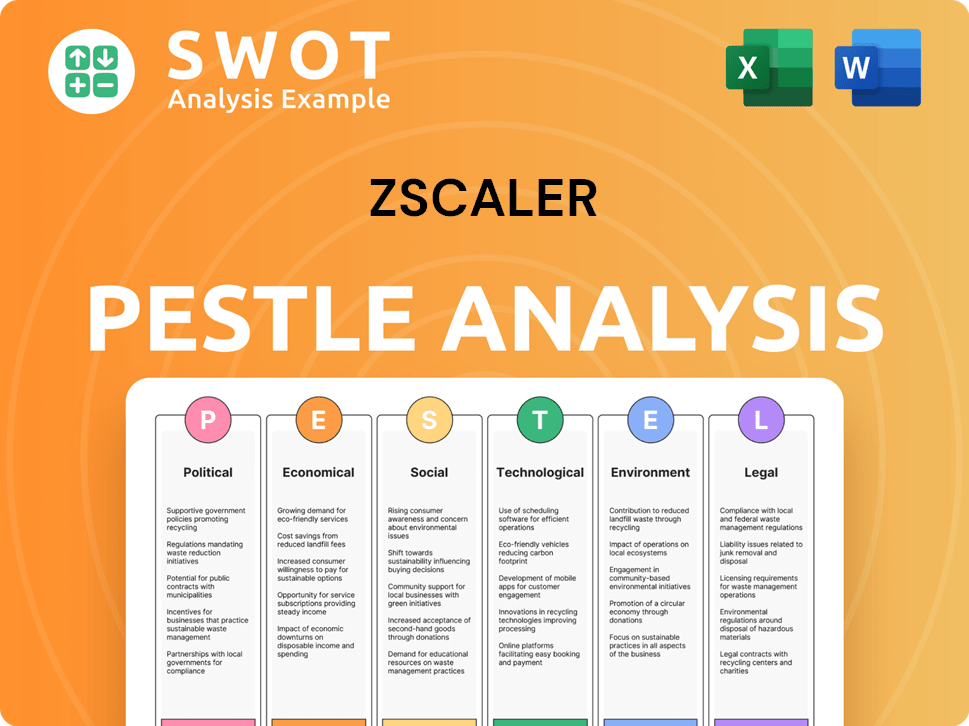
What Is Zscaler’s Growth Forecast?
The financial outlook for Zscaler is robust, underpinned by strong revenue growth and expanding profitability. Zscaler's performance reflects its leading position in the cloud security market and its ability to capitalize on the increasing demand for Zero Trust security solutions. This Zscaler company analysis reveals a trajectory of consistent growth and strategic financial management.
Zscaler's financial health is further evidenced by its effective cost management and operational efficiency. The company's focus on innovation and customer satisfaction, as well as its strategic partnerships and acquisitions, are contributing to its financial success. This approach enhances Zscaler's competitive position and supports its long-term growth potential.
For fiscal year 2024, Zscaler's total revenue reached $2.167.8 million, marking a 34% year-over-year increase. Non-GAAP income from operations for fiscal year 2024 was $442.2 million, or 20% of revenue, compared to $240.8 million, or 15% of revenue, in fiscal year 2023, demonstrating significant improvement in profitability. The company's financial performance is a key indicator of its success in the cloud security market.
Zscaler's revenue growth is a key indicator of its success. For fiscal year 2024, the company reported a total revenue of $2.167.8 million, a 34% increase year-over-year. This growth is driven by strong demand for its cloud security solutions.
Zscaler's profitability has improved significantly. Non-GAAP income from operations for fiscal year 2024 was $442.2 million, or 20% of revenue. This is a notable increase from the $240.8 million, or 15% of revenue, in fiscal year 2023.
Zscaler has raised its guidance for fiscal year 2025. The company forecasts revenues in the range of $2.659 billion to $2.661 billion, suggesting approximately 23% year-over-year growth. Calculated billings are expected to be between $3.184 billion and $3.189 billion.
Non-GAAP earnings per share for fiscal year 2025 are projected in the range of $3.18 to $3.19. This reflects the company's confidence in its market position and growth prospects. These projections are based on the company's current performance and future expectations.
In Q3 fiscal year 2025, Zscaler reported revenues of $678 million, a 23% year-over-year increase, and an Annual Recurring Revenue (ARR) of approximately $2.9 billion. The gross margin was approximately 80.3%, and the operating margin was approximately 22%. This performance highlights Zscaler's strong market position and ability to generate revenue.
Zscaler's Annual Recurring Revenue (ARR) is approximately $2.9 billion. The Dollar-Based Net Retention (DBNR) rate is 114%, indicating strong customer satisfaction and successful upselling efforts. These metrics highlight the company's ability to retain and grow its customer base.
Zscaler ended Q3 with approximately $3 billion in cash, cash equivalents, and short-term investments. The company's strong cash position provides financial flexibility and supports its growth initiatives. This financial strength allows for strategic investments and acquisitions.
The company's gross margin was approximately 80.3% in Q3 fiscal year 2025. Zscaler's operating margin in Q3 fiscal year 2025 was approximately 22%. These high margins demonstrate the efficiency of Zscaler's operations and its ability to generate profits.
Zscaler's free cash flow margin was 18% in Q3 fiscal year 2025. This strong free cash flow generation further supports the company's financial flexibility. This allows Zscaler to invest in future growth.
Management expects sales productivity to continue improving throughout fiscal year 2025, with the second half being stronger than the first. This indicates a positive outlook for future revenue growth. This is a key factor in driving the company's Zscaler growth strategy.
Zscaler's financial flexibility is supported by holding more cash than debt on its balance sheet. This strong financial position allows the company to pursue strategic initiatives and navigate market challenges. This is a key factor in Zscaler's long-term growth potential.
Zscaler's strong financial performance and positive outlook are driven by the increasing demand for cloud security solutions and the company's focus on innovation and customer satisfaction. The company's ability to maintain high margins and generate strong free cash flow positions it well for continued growth. This positive outlook is also supported by the company's investment in Marketing Strategy of Zscaler.
- Continued Revenue Growth: Zscaler is expected to maintain strong revenue growth, driven by the increasing adoption of cloud security solutions and its Zero Trust security offerings.
- Profitability Expansion: The company is expected to improve its profitability through efficient cost management and operational improvements.
- Market Leadership: Zscaler is well-positioned to maintain its leadership in the cloud security market, supported by its innovative product offerings and strong customer relationships.
- Strategic Investments: The company is likely to continue making strategic investments in research and development, sales and marketing, and potential acquisitions to drive future growth.
Zscaler Business Model Canvas
- Complete 9-Block Business Model Canvas
- Effortlessly Communicate Your Business Strategy
- Investor-Ready BMC Format
- 100% Editable and Customizable
- Clear and Structured Layout
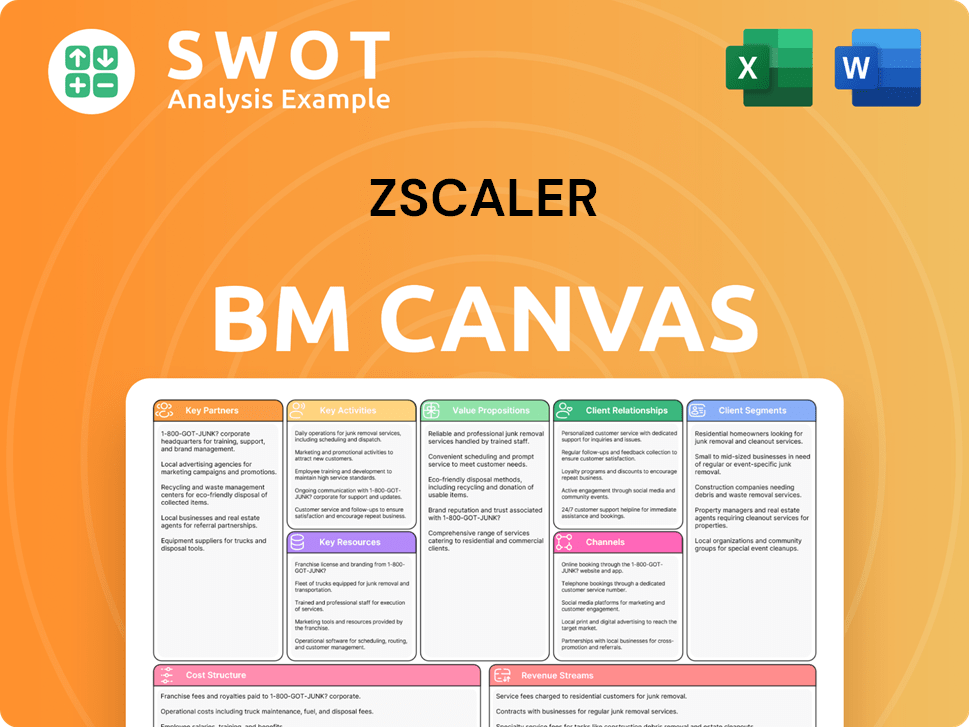
What Risks Could Slow Zscaler’s Growth?
The path for the company, while promising, is not without its challenges. The cybersecurity landscape is fiercely competitive, and macroeconomic factors could influence enterprise IT spending. Navigating these risks is crucial for the long-term success of the company.
Several potential obstacles could impact the firm's growth trajectory. These include competitive pressures from established and emerging players in the cloud security market, execution risks tied to ambitious expansion plans, and reliance on third-party infrastructure providers. The company must continuously adapt and innovate to maintain its position.
Furthermore, the evolving threat landscape, particularly the rise of AI-driven attacks, poses a significant challenge. The company must proactively address these threats and ensure its solutions remain effective. Understanding and mitigating these risks are vital for sustaining growth and delivering value to stakeholders.
The cloud security market is highly competitive, with established firms and new entrants vying for market share. Maintaining a competitive edge requires constant innovation and adaptation. The company faces strong competition from players like Palo Alto Networks and Cisco.
Economic downturns can impact enterprise IT spending, potentially slowing the company's growth. Economic fluctuations can affect the demand for cloud security solutions. Monitoring and adapting to macroeconomic trends are essential for strategic planning.
The company's ambitious growth plans and ongoing sales transformation efforts carry execution risks. Successfully scaling operations and integrating new technologies are critical. Efficient execution is vital for achieving revenue growth and market expansion.
Dependence on third-party cloud providers for infrastructure introduces potential vulnerabilities. Ensuring the reliability and security of these partnerships is crucial. Managing these relationships effectively is essential for maintaining service availability and data protection.
The emergence of agentic AI and open-source models poses new cybersecurity threats. The shift towards sophisticated AI-driven attacks requires continuous adaptation of security measures. The company must stay ahead of these evolving threats to protect its customers.
Some criticisms include the complexity of setup and configuration, and potential variability in performance. Addressing these internal challenges is crucial for customer satisfaction and retention. Improving the customer experience is vital for long-term success.
The company's approach to mitigating these risks involves continuous innovation, strategic acquisitions to enhance threat detection, and a strong focus on expanding its Zero Trust platform. The company's financial health, including its solid cash reserves, provides a buffer against these challenges. For instance, the company's acquisition of Red Canary illustrates its commitment to bolstering its threat detection and response capabilities. The company's journey is detailed in Brief History of Zscaler, highlighting key milestones and strategic decisions.
The cloud security market is highly competitive, with firms like Palo Alto Networks and Cisco also vying for market share. Maintaining a competitive edge requires continuous innovation and strategic investments. The company's ability to differentiate its offerings is crucial.
Economic downturns can impact IT spending, potentially affecting the company's revenue growth. Monitoring macroeconomic trends and adjusting strategies accordingly are important. Economic stability is crucial for sustained market expansion.
The company's ambitious growth plans and ongoing sales transformation efforts present execution risks. Successfully scaling operations and integrating new technologies are critical. Efficient execution is vital for achieving revenue growth and market expansion.
The emergence of AI-driven attacks poses a significant challenge to existing security measures. The company must continuously adapt its solutions to counter these threats. Staying ahead of technological advancements is crucial for maintaining market leadership.
Zscaler Porter's Five Forces Analysis
- Covers All 5 Competitive Forces in Detail
- Structured for Consultants, Students, and Founders
- 100% Editable in Microsoft Word & Excel
- Instant Digital Download – Use Immediately
- Compatible with Mac & PC – Fully Unlocked
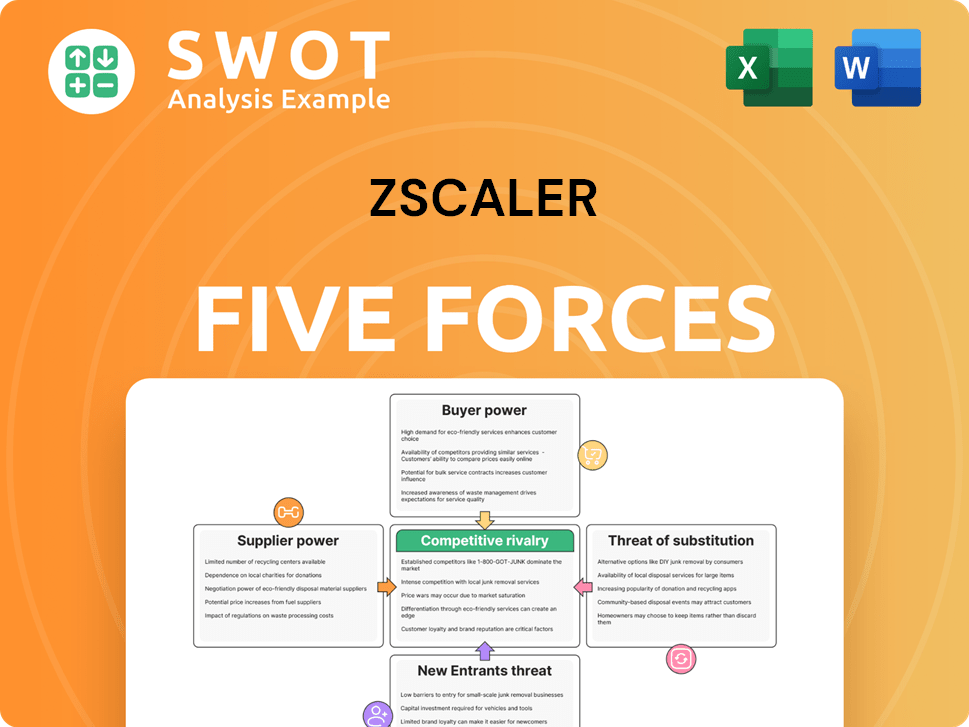
Related Blogs
- What are Mission Vision & Core Values of Zscaler Company?
- What is Competitive Landscape of Zscaler Company?
- How Does Zscaler Company Work?
- What is Sales and Marketing Strategy of Zscaler Company?
- What is Brief History of Zscaler Company?
- Who Owns Zscaler Company?
- What is Customer Demographics and Target Market of Zscaler Company?
Disclaimer
All information, articles, and product details provided on this website are for general informational and educational purposes only. We do not claim any ownership over, nor do we intend to infringe upon, any trademarks, copyrights, logos, brand names, or other intellectual property mentioned or depicted on this site. Such intellectual property remains the property of its respective owners, and any references here are made solely for identification or informational purposes, without implying any affiliation, endorsement, or partnership.
We make no representations or warranties, express or implied, regarding the accuracy, completeness, or suitability of any content or products presented. Nothing on this website should be construed as legal, tax, investment, financial, medical, or other professional advice. In addition, no part of this site—including articles or product references—constitutes a solicitation, recommendation, endorsement, advertisement, or offer to buy or sell any securities, franchises, or other financial instruments, particularly in jurisdictions where such activity would be unlawful.
All content is of a general nature and may not address the specific circumstances of any individual or entity. It is not a substitute for professional advice or services. Any actions you take based on the information provided here are strictly at your own risk. You accept full responsibility for any decisions or outcomes arising from your use of this website and agree to release us from any liability in connection with your use of, or reliance upon, the content or products found herein.